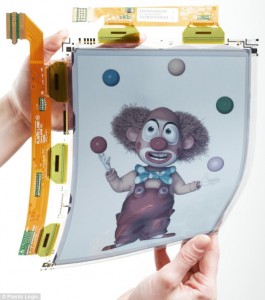Ever thought of working on a PC or an ultrabook with screen as thin as a sheet of paper? Well, there is a new gadget at the International CES called Paper Tablet or ‘PaperTab’.
Gone are the days watching your laptop screen without any direct interaction with it. With the evolution of touchscreen and Windows 8 functionality the interaction is made possible by touching and interactive with the screen. Going beyond, the new PaperTab is a tablet where you will have bendable touchscreen. That means one can bend the screen to control certain functions.

At the CES, Intel and Plastic Logic Company displayed the PaperTab gadget which is developed in collaboration with Canada’s Queen’s University. The PaperTab is as thin as paper and can be twisted or can be dropped without a fear of getting damaged The PaperTab is a bendable touchscreen with 10.7-inch high-resolution plastic display. It is powered by second generation Intel CoreTM i5 Processor.
“Flexible Plastic display allow a natural human interaction with electronic paper, being lighter, thinner and more robust compared with today’s standard glass-based displays,” says Plastic Logic CEO Indro Mukerjee in a statement. “This is just one example of the innovative revolutionary design approaches enabled by flexible displays.”
User can bend the PaperTab display and use its flexibility feature for applications and games such as fast forwarding a video or increasing car speed by bending corner of the display. It can also be used as e-book, with user bending the screen to turn to the next page. PaperTab users will have multiple interactive displays instead of traditional way of having several applications on one display.
“Using several PaperTabs makes it much easier to work with multiple documents,” said Roel Vertegaal, Director of Queen’s University’s Human Media Lab.
Larger drawings are created simply by placing two or more PaperTabs side by side.
For email, separate displays serve as an Inbox, Outbox, and Compose Mail. When a user wants to read an email, they tap the Inbox to display the message in a separate tab.
No details were given on when flexible displays might end up in consumers’ hands but Intel claims that the PaperTab will replace the traditional screen in next 5 to 10 years.